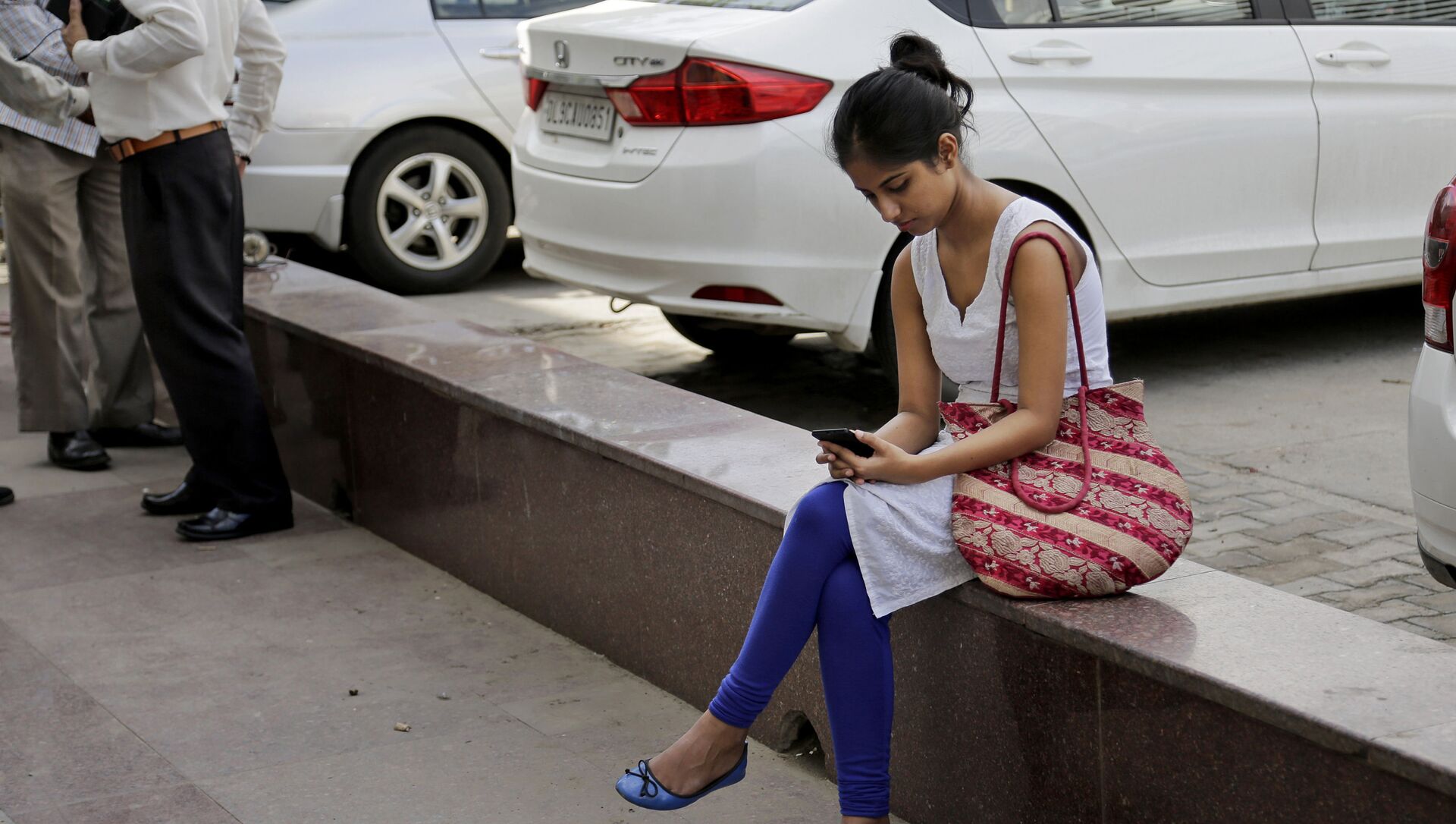https://sputnikglobe.com/20210720/intimate-matter-fem-tech-and-rising-female-health-surveillance-can-pose-threat-to-womens-privacy-1083422052.html
'Intimate Matter': Fem-Tech and Rising Female Health Surveillance Can Pose Threat to Women's Privacy
'Intimate Matter': Fem-Tech and Rising Female Health Surveillance Can Pose Threat to Women's Privacy
Sputnik International
During his Independence Day speech, Indian Prime Minister Narendra Modi announced the launch of the National Digital Health Mission (NDHM). The ongoing... 20.07.2021, Sputnik International
2021-07-20T11:20+0000
2021-07-20T11:20+0000
2022-07-19T10:37+0000
newsfeed
world
privacy
data protection
women
healthcare
https://cdn1.img.sputnikglobe.com/img/07e5/03/0f/1082346226_0:0:3197:1809_1920x0_80_0_0_d721d754cc9c68f422e3051080fe3557.jpg
The advance of technology has opened many doors in various sectors around the world. In India, shattering all taboos, FemTech is taking control of women's intimate hygiene, personal wellness, and health solutions. Rather than being all coy about the issue, digitised wellness trackers map the dates and keep a note of hormone-driven symptoms such as hot flushes, insomnia, anxiety and loss of libido - among other things - and are gaining popularity among Indian women.In 2019, UK-based advocacy group Privacy International revealed that period-tracking apps including MIA Fem and Maya - owned by India-based Plackal Tech - sent personal data about female users (such as their use of contraception, the timing of their monthly period, symptoms such as swelling and cramps, and more, directly to Facebook.The femtech sector targets women's issues such as menstruation and period care products, fertility and birth control, pelvic health, menopause, hormonal disorder among others. It is worth pointing out that to get efficient results, women users are supposed to share deeply personal and intimate details.A typical period-and-ovulation-tracking app extracts intimate information from women about their body in exchange for the ability to give users an option to digitally track their menstrual cycle. Consequently, users give away sensitive information such as sexual behaviour, and the duration and physical and emotional bodily symptoms related to their menstrual cycle.However, when such information is presented with such data as name, age, and location as well as email address and phone number, the user can be easily identified. In most cases, such apps provide users with a simple sign-in by linking their account to existing social media or email accounts, according to cyber experts.Mehta also said that there is a need to control surveillance capitalism that involves data collection and processing in a way that is exploitative in nature. "In India, the data governance frameworks are at an almost embryotic stage. At present, in the absence of a functional personal data protection Bill, this control is rather limited owing to scattered and insufficient legislation in the area," Mehta said.In 2018, the European Union General Data Protection Regulation (EU GDPR) came into force and it made important changes to boost user rights by giving them more control over their data and information relating to the use of their data. In India, because of a lack of awareness, Indians still behave quite casually about protecting their private data.
https://sputnikglobe.com/20210318/disruption-of-health-services-in-india-to-lead-to-highest-loss-of-life-in-south-asia-un-report-says-1082379148.html
https://sputnikglobe.com/20210603/privacy-row-indian-govt-slams-whatsapp-for-obtaining-trick-consent-using-anti-user-policy-1083063059.html
Sputnik International
feedback@sputniknews.com
+74956456601
MIA „Rosiya Segodnya“
2021
Sushmita Panda
https://cdn1.img.sputnikglobe.com/img/07e5/05/12/1082926186_0:0:2048:2048_100x100_80_0_0_4474d0d7e27a36878eb8727832be74b4.jpg
Sushmita Panda
https://cdn1.img.sputnikglobe.com/img/07e5/05/12/1082926186_0:0:2048:2048_100x100_80_0_0_4474d0d7e27a36878eb8727832be74b4.jpg
News
en_EN
Sputnik International
feedback@sputniknews.com
+74956456601
MIA „Rosiya Segodnya“
Sputnik International
feedback@sputniknews.com
+74956456601
MIA „Rosiya Segodnya“
Sushmita Panda
https://cdn1.img.sputnikglobe.com/img/07e5/05/12/1082926186_0:0:2048:2048_100x100_80_0_0_4474d0d7e27a36878eb8727832be74b4.jpg
newsfeed, privacy, data protection, women, healthcare
newsfeed, privacy, data protection, women, healthcare
'Intimate Matter': Fem-Tech and Rising Female Health Surveillance Can Pose Threat to Women's Privacy
11:20 GMT 20.07.2021 (Updated: 10:37 GMT 19.07.2022) During his Independence Day speech, Indian Prime Minister Narendra Modi announced the launch of the National Digital Health Mission (NDHM). The ongoing pandemic has also motivated the government towards digitisation. However, there is a growing prevalence of privacy threats and increased surveillance concerns.
The advance of technology has opened many doors in various sectors around the world. In India, shattering all taboos, FemTech is taking control of women's intimate hygiene, personal wellness, and health solutions. Rather than being all coy about the issue, digitised wellness trackers map the dates and keep a note of hormone-driven symptoms such as hot flushes, insomnia, anxiety and loss of libido - among other things - and are gaining popularity among Indian women.
In 2019, UK-based advocacy group
Privacy International revealed that period-tracking apps including MIA Fem and Maya - owned by India-based Plackal Tech - sent personal data about female users (such as their use of contraception, the timing of their monthly period, symptoms such as swelling and cramps, and more, directly to Facebook.
Several industry insiders told Sputnik that advertisers often look for the user's state of mind so that they strategically target ads. After the Privacy International report came out, four of the apps made changes in their data-sharing practices or launched internal investigations.
The femtech sector targets women's issues such as menstruation and period care products, fertility and birth control, pelvic health, menopause, hormonal disorder among others. It is worth pointing out that to get efficient results, women users are supposed to share deeply personal and intimate details.
"As an infertility start-up we collect data via organic registrations on the app. Data breaches can affect a woman's confidence, personality and trust with various apps online. We prevent it by encrypting the same and also take the required permissions or approval from women at the time of registration," Snneha Lukaa, co-founder of BabyReady, told Sputnik.
A typical period-and-ovulation-tracking app extracts intimate information from women about their body in exchange for the ability to give users an option to digitally track their menstrual cycle. Consequently, users give away sensitive information such as sexual behaviour, and the duration and physical and emotional bodily symptoms related to their menstrual cycle.
However, when such information is presented with such data as name, age, and location as well as email address and phone number, the user can be easily identified. In most cases, such apps provide users with a simple sign-in by linking their account to existing social media or email accounts, according to cyber experts.
"Information conduits created via collection from apps such as this in the wrong hands could prove harmful to an individual’s interests — especially if those individuals are women/marginalised individuals. While men face similar threats from healthcare technology, women face greater harms because of menstrual or reproductive surveillance, a nuanced subset of surveillance capitalism," Shefali Mehta, programme manager of the think-tank, The Dialogue, told Sputnik.
Mehta also said that there is a need to control surveillance capitalism that involves data collection and processing in a way that is exploitative in nature. "In India, the data governance frameworks are at an almost embryotic stage. At present, in the absence of a functional personal data protection Bill, this control is rather limited owing to scattered and insufficient legislation in the area," Mehta said.
In 2018, the European Union General Data Protection Regulation (EU GDPR) came into force and it made important changes to boost user rights by giving them more control over their data and information relating to the use of their data. In India, because of a lack of awareness, Indians still behave quite casually about protecting their private data.







